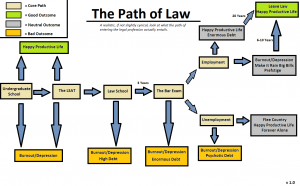You can consider this post a sort of follow up to this post. It also seeks to address something that people tend to erroneously assume about being a freshly minted lawyer in the modern world. The assumption this time around is that you will, of course, make it rain.
So lets leave law school behind for a moment. Yes I know that is a little bit odd to do before its even really started, but much like my last 101 post (linked above), I want to address something. As soon as I started talking to people about my law school acceptances, there was an immediate assumption that I would undoubtedly be able to dance in piles of money. To be fair, there may once have been some grain of truth to this, but times have drastically changed, and they have changed for the worst.
First, not all lawyering jobs are created equal. That much is probably pretty obvious to most people. When you thing of the big firm partner, you probably think of mad moniez, but when you think of the “ambulance chaser” or the public defender you probably don’t see the same gold piles. Ironically “ambulance chasers” probably have the best chance to get rich, but also have extraordinarily high chances to live in a cardboard box as well. Taking this to be true, then you’ll also have to agree that not all law students will ever go on to make very much money. In fact, a fair number of law students will go on to make less money than you do. But, “Taco!” you say, “You told us that law school costs hundreds of thousands of dollars, why would you pay that much to only make 30,000$ a year!”
Why Indeed
The answer is twofold. First, for the vast, vast majority of people, its because they “strike out.” Which is basically a fancy way of saying that they either got a low-paying law job that they did not want and likely sucks, or they got no job at all and took their 1/4 million dollar degree and work at a job they could have got with their Bachelor’s. This is the sad state of the legal profession, literally almost 50% of the entire entering workforce will either get no legal job, or they will get an abysmally bad legal job. That is the “bad” side of the coin.
[Its important to note here, that these people were NOT necessarily lazy, many were very hard workers who simply lost the law school gamble, it can happen at any school.]
The other side of the coin is less negative, but still doesn’t involve much money. For the other low-earners, its actually something they chose. “WHAT!?” Yes, some people don’t make career decisions based on income, crazy, I know. These people tend to go into what is very broadly referred to as “Public Interest” work. If you are thinking that these are the Hippie Save The Whales Tree-Huggers, then you are not incorrect, but its also not the entire picture. Public defenders, (some) government workers, human rights workers, low-income councils, specialized agencies or firms, etc. are all included in public interest, or PI. Generally speaking, again very roughly, if the primary goal is not to make big piles of money, then its likely that you are in the PI area of the legal profession (which is opposite the “Private” sector). These jobs tend to pay way, way, way less than the private jobs. However, the caveat is that job satisfaction tends to be much higher for these PI workers. That likely comes from a myriad of reasons, largely having a sense of purpose outside of money, such as helping low income people fight off their abusive landlords. You might be thinking that this sounds not to bad, well it isn’t, other than that you make little money. However, don’t think that these jobs are easy to get. In fact, in an ironic twist, these jobs are often harder to get than the private sector jobs, because there are less of them and the people who want them, really want them. So, even if you want the low paying job, you have to work hard AND get lucky.
The opposite side of this is the private sector jobs. Now, there are a lot of these and many of them do not pay well. There are a few arbitrary tiers, such as “Shit Law,” “Small Law,” “Mid Law,” and “Big Law.” None of which have precisely defined borders, though most people will agree that you want to stay the living hell away from Shit Law. In a nutshell, shit law is basically all the drawbacks of the tiers above it, with only a scant portion of the pay. Does this mean that Big Law > All, well, it might for some people, but its not universal. Big Law is notorious for life-crushing stress levels. So, for some people Small Law or Mid Law might be better options, however, its HUGELY firm dependent. Law firms, even between tiers are VASTLY different work places, just the same as how Plumbing Company A might be 100x better to work at than Plumbing Company B. For the purposes of this discussion, we are going to focus on Big Law, which is the primary goal for most private sector seekers and is the most clearly defined.
Basically, Big Law = a “Big” paycheck, big hours, big stress, and big chances for upward and outward career prospects (IF you don’t get fired). Lets talk about each of these areas a little bit, starting with the good thing.
One thing that Big Law does well, better than all but the most esteemed of PI jobs, is give you a lot of exposure to powerful people who might end up liking you. This means you can lateral to better jobs, lateral to better fields, or simply move up the firm ladder. None of this is guaranteed (in fact some would say its unlikely) but the chance is there. The better the firm, the better the connections. Pretty straightforward. By and large, this is the one true, largely uncontested, advantage of Big Law.
However, the rest of the picture is pretty bleak. First, stress is amazingly high in Big Law. Additionally, if you get a “bad” firm, or even are placed under a “bad” partner at a “good” firm, you will very likely be verbally abused on a daily basis.
I’m not talking: “Oh mer gehrd my boss hurt my pansy feelings!”
I’m talking: “What the f*ck you stupid piece of shit, why was that brief not sent to the client by 8am. You must come from a filthy scum-filled inbred, worthless goat-f*cking, family. Holy hell what a moron.”
On a daily basis.
And no, I’m not making this up. True, its one of the more extreme examples, but Its part of the culture of Big Law, its the Good Ole Boys club to the extreme and if you make the wrong kind of waves you can easily kill your entire career. Furthermore, the work itself is stressful on top of the environment being stressful. Most people can’t and don’t handle it and end up exiting stage left, if they aren’t fired first.
The stressfulness of the work also means you have a large workload. 40 hour weeks do not exist in Big Law, 50 is considered lucky, 60 (or more) is the norm. Sure, this isn’t especially unique, lots of fields work the same or more. But its just something to take note of, because it means you’re dealing with that stress for 60 hours a week, not 40. Coupled with the “billable hour” (which is basically that time that you can actually bill a client) your “big” salary ends up breaking down to a lot less per hour than it might initially seem.
So lets get to that juicy salary.
MAKE IT RAIN AM I RITE!?! I RED ON TEH INTERWEBS DAT LAWYERS MAKE LEIK 160,000 DOLLARS A YEAR RITE OUT OF SKEWL. WOOOO DAYUM. MUST BE NICE TO BE RICH WITH NO EFFORT. AM I RITE!?
If that is what you think, kindly go smash your face into a wall. I can wait.
Thanks.
So what is the deal. Maybe you did read that new lawyers make 160,000$ a year and you did read it at some reputable site like Weekly World News or The National Enquirer. The truth is, some new lawyers do make that much. The operative word is some. Not all, not most, some. It might also be easy to think that these “some” is all the people at the top schools. Nope, also not true. While it is true that the tops schools put you in a much better position that low ranked schools (possible vs. impossible), its not a given. The truth is, the vast majority of lawyers make nowhere near 160,000$ a year starting out.
“Yes, yes, but some do, so blah.”
Ok, that’s fair enough. Yes, some do. But, if you’re going to base your idea of starting legal profession earnings on the highest earners in the profession then you need to be realistic about it. First of all, 160,000$ does not exist everywhere. You won’t be working in ultra-low cost of living town in Nebraska and make 160,000$. Most of the 160k jobs are centered in the major markets, such as New York City, Chicago, LA, DC, etc. Of these major markets, NYC is the biggest, so we’ll focus our attention there (since its where a 160k earner is most likely to be).
Starting out, you have your 160,000$. But it gets better! Depending on your firm, you’ll probably have a bonus on top of that. (CRAY-CRAY I NO). These bonuses vary greatly, but since we’re maxing things out, we’ll look at the high-average bonus of 10,000$. To make things easy, we’re going to lump this into the 160,000 to make a starting salary of 170,000$ for our recent law graduate. Because they got that sweet Big Law job, they live in Manhattan because they work 12 hour days and don’t have time to commute from the cheaper areas of the city.
So, 170,000$.
Now, its time to pay the tax man. There are a lot of calculations to be had here. I’m too lazy to type them all out, but trust me I have researched this. You can either accept what I say is true, or go research it yourself. The choice is yours. But basically, it boils down to this. That 170k is going to turn into 100k if you are married or around 93k if you are single. If you think that is insane, then you don’t know NYC taxes. Since I’m married, we’re going to assume 100,000.
170,000 – Taxes = 100,000
Aww yiss. 100 grand. Bling bling holla.
Hold up dere. You’ve forgotten something important. Loans. Oh yes, those things. Remember, in all likelihood the person who is now making 100k how loads of student loans from law school. We’ll take a high end debt, since we took a high end salary and say 250,000$. This would assume “sticker” cost of attendance at a law school. Now, again, loads of variables here. A lot of it depends on your repayment plan. Since you are on a big law salary, you’ll get no loan assistance like the PI people will. However, to keep things simple, we are going to say you are paying 30,000$ per year in loans, which is probably the around the minimum you could pay can not get in trouble.
So, 100,000 – Loans = 70,000
Ok, 70,000$ not bad. Not great in NYC, let alone Manhattan, but not bad.
Cost of living time, yay! To live an “average” (i.e. frugal by most standards) life in Manhattan, between rent, utilities, food, etc. will probably cost you around 42,000$ per year.
So, 70,000 – Living = 28,000
Alright, 28,000 in da bank each year! Nope, sorry, not done yet. If you have any sense, you’ll also have things like a 401k. This will probably take around another 15,000$ each year out of your salary, if you go with low contributions.
So, 28,000 – 401k = 13,000
Ehh. But wait, we still are not done. There are those lovely miscellaneous expenses that crop up in life. We will go with a lower number on these to play it safe and say 4,000$ (remember everything costs WAY more in Manhattan).
So, 13,000 – Unexpected expenses = 9,000.
There you go.
You work around 3,240 hours per year, to save approximately 9,000$. That is your discretionary income. That 9,000$ is what you get for an entire year to either save or spend on something like Netflix. Suddenly you don’t seem so rich. My guess is that if most people who make far less than a gross of 170,000$ engaged in the budgeting required to have 9k to spend on the part of our law student, then they would end up with far more than 9k. Its also important to keep in mind, that this is assuming minimum payments on your loans, which means you’ll be paying them for up to 25 freaking years in many cases (and that’s assuming you can actually pay them). And oh yeah, they can’t be discharged until you die or become extraordinarily disabled. Bankruptcy won’t even begin to save you.
Now, you might be thinking that 9,000$ in discretionary income per year really isn’t that bad, especially compared to most people. I won’t try to lie and say it is. It gives you around 166$ a week to spend or save. But what I cannot stress enough is that that is based on minimum loan payments. The overall point is thus, you will NOT be making it rain with your 170,000$ a year salary.
So, to bring things around. You really have three options as you enter the legal profession, which place you end up is based both on skill and luck (possibly even more so on the later). The first option is either a non-legal job or a bad private sector legal job. The second option is a low paying public interest job. The third is a “high paying” good private sector legal job. The thing you’ll notice about all these options is that none of them make you rich.
[Side note here. If you are wondering how the public interest people survive, its because of school or governmental programs that assist them repay their loans. Without these there would literally be no public interest people except for those who were already wealthy, which isn’t exactly ideal (since the rich already run everyone’s lives enough as is.) If you are wondering how the “struck out” low income people who aren’t in jobs eligible for repayment assistance survive, the answer is a morbid “sometimes they don’t”.]
Now, to be fair, this post doesn’t focus on the entire picture. Overtime your salary will increase. Or, you may live in a cheaper area (but won’t make as much). The reason that isn’t problematic to assume that you’ll stick around long enough in a high paying job long enough to get those raises is that you likely won’t. Attrition rates for many firms are around 2/3 at the three year mark. Meaning around 66% of people never make it past three years in Big Law. Yeah, its that bad. Now, these outcomes are not always that they were fired (though many are, its the nature of the system – not necessarily that they are “bad” employees – its a tiered system where they need to keep the bottom level workers are constantly being rotated out so that those on top can keep their places, a pyramid of sorts). Some go to other jobs, which almost always involve a drastic pay-cut, thus making the argument that they will make more over time a moot point. The PI people will make more as well and are less likely to quit or be fired, but they still are making nowhere near 160,000 or even 100,000 a year. In all likelihood, the PI oriented folks might end up slightly worse off than the Big Law people from a financial standpoint, even with the loan assistance (at least for 10-20 years or so, depending on how long it takes their loans to be forgiven).
My closing point is thus. Most lawyers are nowhere near rich. In fact most lawyers have less money to spend or save than you likely do. If they are diligent, frugal, and intelligent about how they proceed through their first few years, they can and sometimes do end up doing well. But the chances of them being “rich” are in all honestly no more likely than any other person. The gilded age of every graduate of a top school becoming a wealthy partner at some world-famous firm is gone, if it ever even existed.
Murkan’ Dream Yo’
Like my last 101 post, I will end this on a positive note. Just like the 160,000$ number is ordinary, so too is the 250,000$ debt load. If I am lucky, I’ll be around 100,000$ short of that number. So while my debt will still equal an invisible house, it will be a slightly less nice invisible house. Though there is also SB’s debt to contend with, but she’ll be earning money as well, so it keeps a lot of my equations fairly the same.
The above is the pile of bling that I will never have. 🙂
But there are more things in life than money, even for lawyers (at least those lawyers who actually end up satisfied with their lives). Squirrels are a good example, or any other cute critter, such as baby sloths.
Until next time,
-Taco



